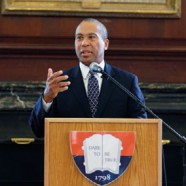
Graduation is rich with traditions and rituals— formal and informal. For instance, the longstanding practice of electing the student speakers assures seniors that at their last Milton gathering, they will hear messages from classmates they chose. More recently, Class I students have been inviting accomplished Milton alumni to be commencement keynote speakers. This year, Massachusetts Governor Deval Patrick, Class of 1974, talked with graduates in Straus Library, prior to the formal commencement ceremony.
Brad Bloom, president of Milton’s board of trustees, introduced Governor Patrick, citing the governor’s “sense of reason, respect for everyone, and the civility that he brings to political discourse at a time when that is very rare.”
After congratulating the graduates, the governor immediately welcomed their questions. His responses wove together his own stories, memories of years on the south side of Chicago as well as his time at Milton. He shared life lessons with Milton students headed off with many aspirations.
- The challenge that we share is how to be great citizens. How do we show the sense of common cause, and reach for that sense of common destiny, which is going to be necessary for us to confront the big issues facing us as a country, as a globe? You’ve been well prepared for that at Milton, as I was, as were generations before me.
- When I was here there were few black students on campus, and few poor students. I had this experience of having a foot in two worlds. The price of admis sion to the one was rejecting the other. When I talked with my pals at home about Milton, their eyes glazed over. My new friends were friendly and some quite marvelous, but they couldn’t process my descriptions of life at home. I felt forced to make a choice, but ultimately I realized that was a false choice. I realized I had to actually decide who I was, and then be that all the time. My real friends would accept that, no matter what. One of the reasons it feels easy for me to move among different settings is that I know who I am. I have a compass of my own, and I’m not worried about fitting in. Milton had a lot to do with that.
- What I loved about Milton was that it was corny. We talked about daring to be true and what that meant. Today we are losing the ability to have a public discourse about values. At Milton we talked about values—it was part of English class, science class, dinner table conversations. To me that was transcendent. That talk made me feel bigger and made the community feel bigger. I’m grateful for that, and I hope it’s still the case here.

- You have a surface appreciation, as I did at 18-years-old, about how many times the decisions in front of you will call into question your values. Hundreds of thousands of little decisions accumulate to who you are inside. It takes courage to make a decision you know to be right when you’re surrounded by people who think otherwise. Having the courage to make the decision and the stamina to stand up to those others voices is a big job.
- In business, I was struck by the incredible pressure to achieve short-term results: to manage for the next quarter and sometimes sacrifice the long-term success of the enterprise. I realized that was the way we were beginning to govern ourselves—for the next election cycle or the next news cycle, not making the hard decisions right now that will make things better for you and your children. I thought I had something to contribute around the idea of generational responsibility.
- Sooner or later, you will have to help us start doing the things we need to do to make sure we leave this place better for those who come behind us. There’s a discipline in serving the greater good that we have to think about over and over again. Are we going to practice making compromises that we know are in our long-term best interest even though they are uncomfortable right now?
- Don’t count out Milton as part of the real world. The world you’re about to inhabit is full of variety. It has beautiful green lawns, and abject poverty right next to it. It has limitless opportunity and people who cannot pay the rent and the heat in the same month. That’s the world. It’s not that the people dealing with hardship are in the real world and others are not. There are people dealing with private crises and silent anxiety in all those worlds.
- I remember as a student going home on vacation, going to meet someone in another part of town and I was late. I ran to jump on the bus and realized I didn’t have enough money for the fare. This grizzled bus driver looked at me with this withering expression and he said, “Sit down son.” I explained that I’d been away at school and hadn’t realized the fare had gone up. I thought he was going to kick me off at the next stop, but his expression softened, and he said, “Pass it on, son.” A simple act of grace that made me want to be a better man. You have that in your power—simple acts of grace. Use that power, especially when people don’t expect them, especially when it’s a stranger. You have that power. I hope you remember that.



